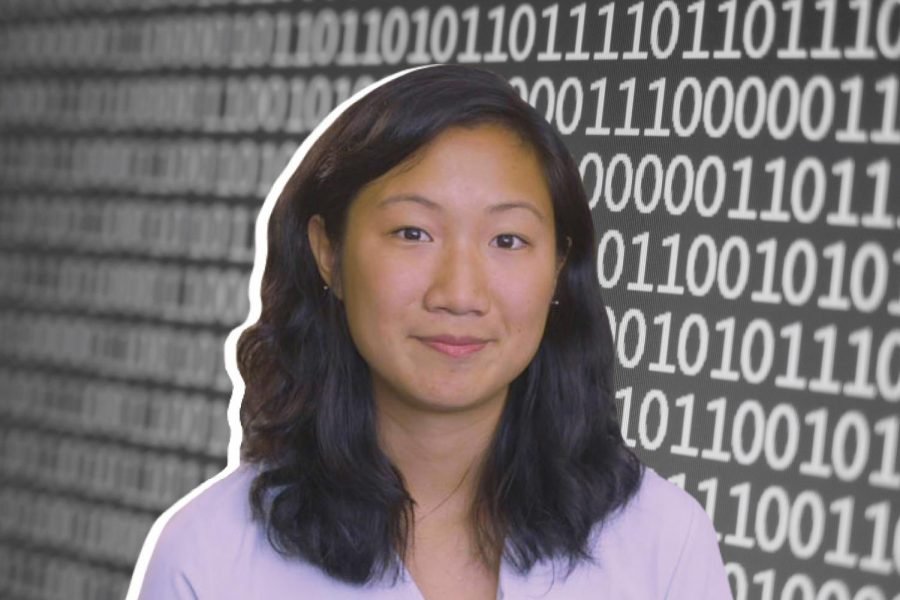Audrey Cheng (MSJ15), co-founder and CEO of Moringa School in Nairobi, Kenya and Kigali, Rwanda. Moringa School provides software development and data science training.
by William Clark, BSJ24
Graphic by Emma Ruck
In the five years since Audrey Cheng (BSJ15) has graduated, she co-founded a software development and data science school with campuses in Kenya and Rwanda, worked with the World Bank to run a 20-week coding program in Pakistan and was featured on Forbes’ “30 Under 30” list for social entrepreneurs.
However, Cheng resists placing too much focus on her recognitions.
“It’s really validating to receive them, but I think ultimately what matters most is, ‘Are we solving a real problem? Are we doing it in a really meaningful and effective way?’” she said.
Cheng is working to solve what she called a “skills gap” in East Africa. The term describes the gap between technical skills African youth are acquiring in schools and the rapidly changing needs of the African economy as it increases automation.
The employment gap is another hurdle African youth face, Cheng said. As the population grows, the economy and jobs market must grow with it, and if it doesn’t, finding employment could become difficult and competitive.
During her sophomore year at Northwestern, Cheng started working remotely with the Savannah Fund, a capital fund that invests in African technology startups. She took the Spring Quarter of her junior year off to work with them in Nairobi, Kenya.
Cheng said she enjoyed the work but realized that as important as investment was, access to technological skills training for local youth was central to economic stimulation.
“You don’t get to build these amazing companies without that kind of skill,” Cheng said.
So, she co-founded a school.
In May 2014, Moringa School started its first class in Nairobi. Moringa offers students short, intensive programs that focus on building technical, career-oriented skills. These courses are split into two sections, a five-week introduction to programming and a 15-week program where students focus on a specific coding language of their choice. Throughout the program, students complete hands-on projects with mentors.
“(Moringa’s learning model) helped me interact with people,” Moringa graduate Ruth Mwangi said. “It also helps you learn to work in teams, because you’re usually put in pairs and have to work with your partner trying to solve problems.”
Other Moringa graduates said the school’s curriculum fosters a sense of community.
“We still have… communication groups in WhatsApp,” Reuben Gathii, a 2020 graduate, said. “We get to talk, we share ideas, we review each other’s code and we learn things from each other.”
But it’s not just the student community that allows for collaboration.
Moringa students receive technical mentors who help them find job opportunities after graduation, Billy Ayiera, another 2020 graduate, said.
Ninety-five percent of Moringa graduates have been hired at reputable companies, and graduates record a 350 percent average salary increase after graduation, according to the school’s website.
Moringa’s sense of community helps students succeed in the technology industry post-graduation, but it also addresses a problem Cheng said she noticed when she started working with Western organizations in Africa.
Too often, Western organizations seeking to “aid” African communities lack knowledge and respect for African independence, cultures and lifestyles, Cheng wrote in a 2014 Huffington Post op-ed. They draw on a stereotypical view of Africa that reduces the continent to disease, poverty, hunger and war, ignoring positivity, growth and vibrancy.
But Moringa is a company, not a charity, and Cheng said she believes this model incentivizes the school to better serve the needs of the community.
“At a nonprofit… the money is coming from donors, and so ultimately organizations are responsible and accountable to their donors, as opposed to… the person that they’re actually serving,” she said. “In a company, because the person who is paying is also the user, we have to be meeting their needs, and we are accountable to our students.”
Moringa also offers need-based flexible installment plans, as well as financial aid amid the COVID-19 pandemic.
Sasha Achieng, who leads community engagement at Moringa, said she frequently surveys the student community to ensure that their needs are met.
Moringa is currently using the online model to access more students across Africa during the pandemic, but in the future, they’re looking into geographic expansion, Cheng said.
“There’s basically space for everyone to grow,” Achieng said. “I mean, if I started (in 2018) as an intern and I’m currently leading in the company, it really speaks for itself, right?”
